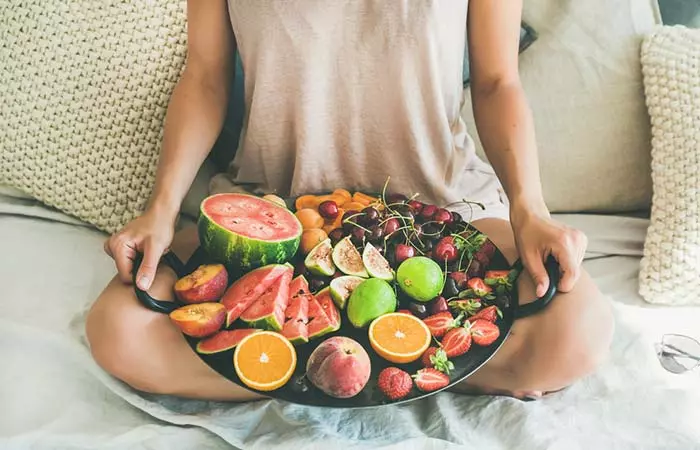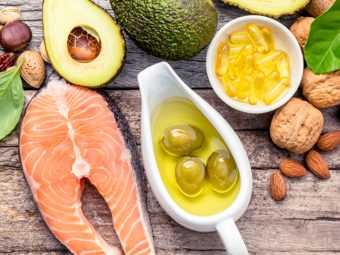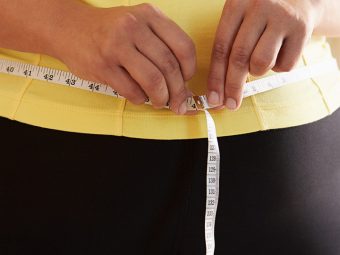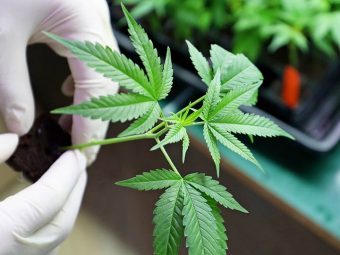This Is How Long (And How Much Food) It Takes To Gain Weight

Image: Shutterstock
Weight loss seems to be everybody’s goal. But what if you are one of those few who wishes to gain weight? Or what if you are one of those paranoid people who think they’ve gained a kilo post a heavy meal?
No matter which of these categories you belong to, today you will learn how much food it exactly takes to gain weight.
Contrary to popular belief, overeating does not instantly add to your pounds. So, if you have a large meal once, you’re safe. However, if you continue overeating (even if the portions are small) throughout the week, you can expect to gain some weight.
But how much weight exactly do you gain? That will be answered by two famous dietitians, Jemma O’Hanlon and Geraldine Georgeou (1), (2).
According to O’Hanlon, an increase in weight occurs when your body is unable to maintain a balance between the kilojoules you consume and the kilojoules your burn. She says that a single heavy meal will not result in weight gain. Weight gain will only happen if the imbalance of kilojoules continues over a considerable period of time.
To simplify it further, Georgeou says that weight gain is the result of not burning up as many calories as you eat or drink.
The Relationship Between The Food You Eat And The Weight You Gain
When it comes to the human body, most things are relative and the same applies to the quantity of food your body needs in order to store it as extra weight.
Georgeou says that your body is always working and using most of the energy it stores to perform tasks, such as breathing, without even thinking about it.
She goes on to say that the number of calories that are needed by the body to carry out its automatic functions when resting is known as basal metabolic rate or BMR (3). The energy requirements to function optimally for each individual can vary and generally depend on factors such as height, physical activity, age, and health condition.
Moreover, the rate at which you burn all the calories you consume, i.e. your metabolism, will also vary, adds Georgeou. The daily activities that help you burn calories include walking, talking or basically any other activity you carry out throughout the course of your day. Besides these, your body will also burn calories when you exercise, which means the more you work out, the more calories you burn.
Georgeou also mentions that static or unchanging weight takes place when the calories you consume from the food you eat equals the amount you burn by carrying out all the basic functions of your body, whether they be conscious or unconscious. This includes actions such as climbing stairs or carrying out household chores.
With that being said, a pertinent question now arises:
How Much Extra Food Do You Need To Gain 1 Kilo Of Weight?
O’Hanlon has the answer to that question. She says that to gain weight, you simply have to consume more kilojoules than your body burns throughout the day. The energy that is leftover will be stored by your body in the form of fat.
She further puts it in figures to give you a clearer idea. She explains that a single kilogram of fat is made up of 37,000 kilojoules. This is because 1g of fat contains 37 kilojoules. So, if you wish to gain about half to one kilo of weight, you will have to consume around 500 calories extra every day, which your body doesn’t end up burning. Now this number doesn’t really sound like much, does it? And it’s not a lot either. Georgeou says that to add that many calories to your diet, you need to only have 2 doughnuts or 2 slices of a pizza. Other foods that contain high calories or kilojoules include (4):
- 1 x McDonald’s Big Mac: 2060kJ
- A large cup of iced coffee: 1720kJ
- 1 x KFC Zinger burger: 3013kJ
- An Indian thali comprising of rice, dal, chicken, roti, veggies, yogurt, and sweets: 4125kJ
Now, it’s important here to keep in mind that an average Indian consumes about 9623kJ or 2300 calories per day, which means it’s pretty easy to increase your calorie intake more than your body needs (5).
Also, another important fact to keep in mind is that individual weight gain can vary and is dependent on a person’s height, metabolism, fitness level, age, and health condition. Which means you likely won’t gain weight overnight, even if you happen to have a large meal. It won’t affect your weight loss plans either.
However, according to O’Hanlon, if you continue eating beyond what your body needs every day, weight gain is an eventuality.
But that doesn’t mean you should get disheartened if you notice an increase in your weight after a heavy meal. Your weight keeps fluctuating throughout the day due to your hydration levels or the foods you have eaten. However, when you digest it, the food consumed is burned as energy.
With that being said, it’s very much easier to gain weight than to lose it. For example, for a 30-year-old woman who weighs 65 kilos and eats a chocolate bar, she will have to spend 25 minutes swimming to burn the fat gained. But that shouldn’t discourage you from trying to keep fit. Also, remember that weight is just a number. What matters is staying healthy!
























